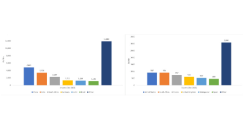Lillka CUTTAREE : We cannot wait 131 years to blossom!
Share

According to the World Economic Forum’s Global Gender Gap Index 2023, it will take 131 years to close the gender gap globally, a mere improvement of 0.3% points compared to last year’s edition.
In Mauritius, the ranking, although improved, is still worrying – 98th out of 146 countries – despite neighbouring countries like Namibia, Rwanda and South Africa closing more than 70% of the overall gender gap last year and be part of the top 20 countries. One of the areas where policies could influence positively is precisely the criteria for economic participation so as to impact positively on broader gender gaps in households, societies and economies.
To start, we need to review in a more holistic way gender gaps in the workplace, whether, in terms of leadership, gender pay, access to promotion, access to childcare or simply job cultural bias. The Women Charter announced last year will hopefully meet this objective across listed companies. Let’s take the more tangible criteria, pay gap: for any rupee a man “manager” gets paid, the woman counterpart on average earns on average 20% less (Source: Statistics Mauritius). This trend is even more obvious across sectors and levels. A female worker in the agribusiness sector can earn 30% less, precisely influenced by a combination of cultural norms, assertiveness and flexibility to work conditions
Women are not always groomed to negotiate for themselves but rather play a carer role, which always has been acknowledged as critical to the stability of the social fabric. Setting targets and monitoring the gaps will allow public entities and organisations to navigate change with consciousness and efficiency.
Why is tackling gender inequality critical for economic growth at the workplace?
Women have great untapped potential in Mauritius. Currently they represent 45% of the total workforce), they are more educated at tertiary level and are highly employed in growth sectors. Because of this high economic potential, they will undoubtedly represent a high economic engine for the country.
Research by the Harvard Business Review found that women outscore men in most leadership skills. Such research bears testament to the immense potential of women when given a more level playing field, through adequate capacity building, (not only building technical skills but also self-esteem) but also by setting more transparent HR processes and affordable childcare. Through public private dialogue, we can then create the right conditions for inclusive growth.
Entrepreneurship might suit some women’s needs better
Indeed, women also traditionally has a great ratio of unpaid chores (3 times more than men) and make up a higher percentage of single parents, so working in a corporate organization can be challenging, given their other commitments. It is also true that we have seen an increased interest from many women professionals especially in the services industry to exit the corporate world and outsource their services, whether locally or regionally. These figures are not tracked properly but represent an untapped zone of opportunities especially within the AfCFTA framework, which will cover also the services sector.
While corporations need to address their workplace policies to be more flexible to women in such situations, creating your own business might be another solution for women, as there could be more room to tailor their work and demands according to their many commitments.
A caveat also to keep in mind is that not all women entrepreneurs can, or are willing to, scale their business.
Micro enterprises versus Scaling
Let me take an example: I once met Leila, a young entrepreneur who launched aromatics soaps after the lockdown. She spent a great amount of time educating herself online on the production processes, found locally a supplier of essential oils and with the financial help of her husband started to produce some amazing products. Her living room was transformed into a storage space and she could only work after hours in the kitchen. She still had to take care of the house, the childcare and the aging parents. I asked her if she would not be interested to scale. Her work will remain seasonal but is critical to the household budget. But what happen if Leila got connected to Marie doing exactly the same type of products and together, they could team up with Nadine a tour operator who could bring their products to the hotels across the island?
It will not only allow Leila and Marie to earn a monthly salary, learn to become financially autonomous but it will inspire peers to emulate and be part of a strong network with access to data, markets and finance.
In an economy characterized by informality and labour market frictions, entrepreneurship has received much attention as an alternative route to not just greater equality, but also growth. However, much of dialogue focuses on the issue of creating new business and providing the right skills set. While the issue of entry is important, the question of scale remains less addressed.
The challenge from a national strategy point of view will be precisely to focus on three factors that might explain the differential barriers to scale women entrepreneurs face – i) absence of market linkages, ii) lack of information and iii) lack of access to social networks. And keep in mind that we may not always create new unicorns but can promote economic empowerment.
Imagining more inclusive public policies
Public leaders must acknowledge that growth cannot happen without the input of half of the population. We need more Leila and Marie to be encouraged to participate in inclusive ecosystems and progressive policies are necessary.
Inclusive policies are the only way forward to dismantle the barriers to women’s professional advancement. It allows not only the creation of a more just society but address economic empowerment and poverty alleviation of the most impacted communities not sitting at the policy table.
I was recently in a workshop where a consultant was questioning the existence of gender gaps in Mauritius. It is real and working women in Mauritius still need to shoulder the majority of caregiving responsibilities, face pervasive harassment and discrimination, are surrounded by traditional bias. Whether in the corporate, social or political spheres, the working environments have been designed for men – intentionally or not.
First, we need to create better public/private collaborations, pathways and innovative solutions that will open more entry points for women from all backgrounds to be part of our growth strategy. For instance, group-based entrepreneurship activities – incubators being the best approach – will allow economies of scale, leverage collective bargaining, enable easier access to markets, and also reinforce stronger networks and role models.
Secondly, decisions makers absolutely need to invest massively in digital literacy to allow women entrepreneurs to get access resources available to them, develop critical thinking, use mobile phone-based tools while fostering a sense of community that might influence both networks and social norms.
Thirdly, we need to mobilise all stakeholders to be part of a more inclusive mindset, amplifying the need of reforms on policies and organisations, building decisions on gender disaggregated data and ensuring that monitoring is meeting inclusive growth.
In March our country will be celebrating our Independence Day – a time we commemorate the spirit of freedom, equality and unity. Let us make the milestone meaningful. The call for action is now. As we cannot wait 131 years to allow women to blossom…

















